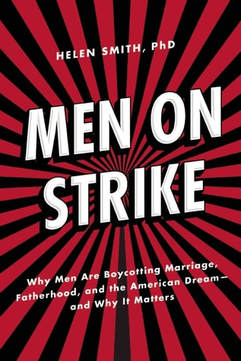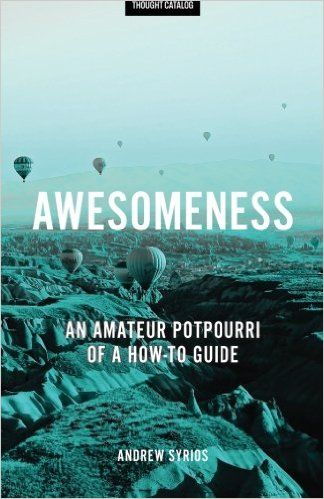|
So the other week I reviewed Between the World and Me, this week I decided I would turn to some identity politics on the Right; namely Helen Smith's book Men on Strike. And in this case, the Right wins in a landslide. Of course, that victory was won almost by default given Dr. Helen Smith actually felt she should make an argument instead of simply asserting a bunch of "facts."
Gender is a complicated topic and unfortunately, the modern narrative boils it down to some pseudo-Marxist dialectic where men are the oppressors and women are the oppressed. Masculinity is toxic, wouldn't you know? It's odd, it would seem, as Dr. Helen points out, that men make up the vast majority of murder victims, suicides, high school drop outs, the incarcerated as well as dying five years younger than women. It's also odd that women would receive child custody in something like 85 percent of all divorces. What kind of patriarchal, male supremacist society would allow for such nonsense? She quotes the work of Jim MacNamara, showing that media portrayals of men are almost universally negative. Which certainly rings true with my experience. I saw a study one time a while back that noted in television advertising, when a man and woman were on screen together and one was made to look smart and the other dumb, it was men made to look dumb 100 percent of the time! I have never before or since seen a study with such a one-sided result. The book delves into negative portrayals of men in the media, unfair family courts, unequal treatment in court, discrimination in the schools and workplace and other such things. It concludes that many men are simply opting out. Men now make up only about 40 percent of college students and marriage rates have been on precipitous decline. Unfortunately, the book does have some short falls. For one, the book seems to be both unfair to women in the present and unfair to men in the past. It simply asserts that "women were discriminated in the past." Which is true. But the past was not nearly as one-sided and obvious in its oppression as many feminists would claim. Let's pull one year at random, say 1917. Would a woman in the United States really feel oppressed because she couldn't vote when her men-folk were being sent off, against their will, like pigs to the slaughter to some God-forsaken trench in Eastern France? We tend to judge the past harshly, but the wealth and abundance we have gives us options they didn't. For one, there's no way society 100 years ago could subsidize so many single mothers. You can say it's bad there are so many broken families around today, and I would agree. But it simply wasn't possible back then. In addition, there weren't antibiotics, so how else did you prevent diseases such as syphilis? Sexual restraint is important now, it was essential then. The way things were wasn't always about oppression. When survival is on the line, debates about gender roles are less important. Indeed, as Jordan Peterson pointed out in his obliteration of Cathy Newman, the more egalitarian a society is, the more likely women and men's interests and careers will diverge. I was also surprised Dr. Smith didn't go much into the dual nature of domestic violence that many feminists have fought long and hard to obfuscate. Indeed, the Partner Abuse State of Knowledge Project reviewed 1700 studies on the matter and found women were slightly more likely to commit domestic violence, although women also got hurt more by it. But it also doesn't address many modern problems women have, other than noting the negative effects men opting out of society will have on women. (To Dr. Helen's credit, she doesn't stress this as the biggest problem, there is a tendency for those talking about problems men face as if they are first and foremost, a problem for women.) For example, women are being pulled in two different directions with regards to career and family. This is something a difficult choice and a lot of pressure men, for the most part, get to avoid. Furthermore, there are becoming major problems with violence against women, particularly in Europe, as migrants from backwards countries move in and have, at least so far, failed to assimilate. That being said, probably the aspect of the book is how polemical it is. Several times, she talks about posting a question on her blog and reading the responses her readers gave. These examples made the book itself feel a little like a long blog post. Despite the book's flaws, however, Men on Strike is a much needed rejoinder to the one-sided debate we get in the media these days. Hopefully we'll hear more of this kind of thing, along with #MeToo and the like going forward.
Comments
|
Andrew Syrios"Every day is a new life to the wise man." Archives
November 2022
Blog Roll
The Real Estate Brothers The Good Stewards Bigger Pockets REI Club Meet Kevin Tim Ferris Joe Rogan Adam Carolla MAREI 1500 Days Worcester Investments Just Ask Ben Why Entrepreneur Inc. KC Source Link The Righteous Mind Star Slate Codex Mises Institute Tom Woods Michael Tracey Consulting by RPM The Scott Horton Show Swift Economics The Critical Drinker Red Letter Media Categories |

 RSS Feed
RSS Feed


